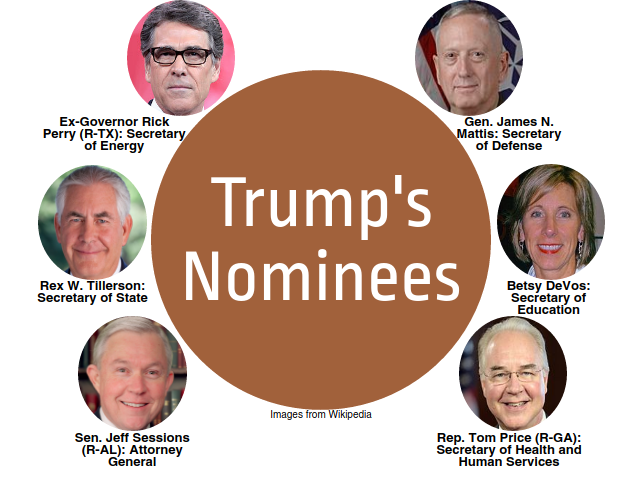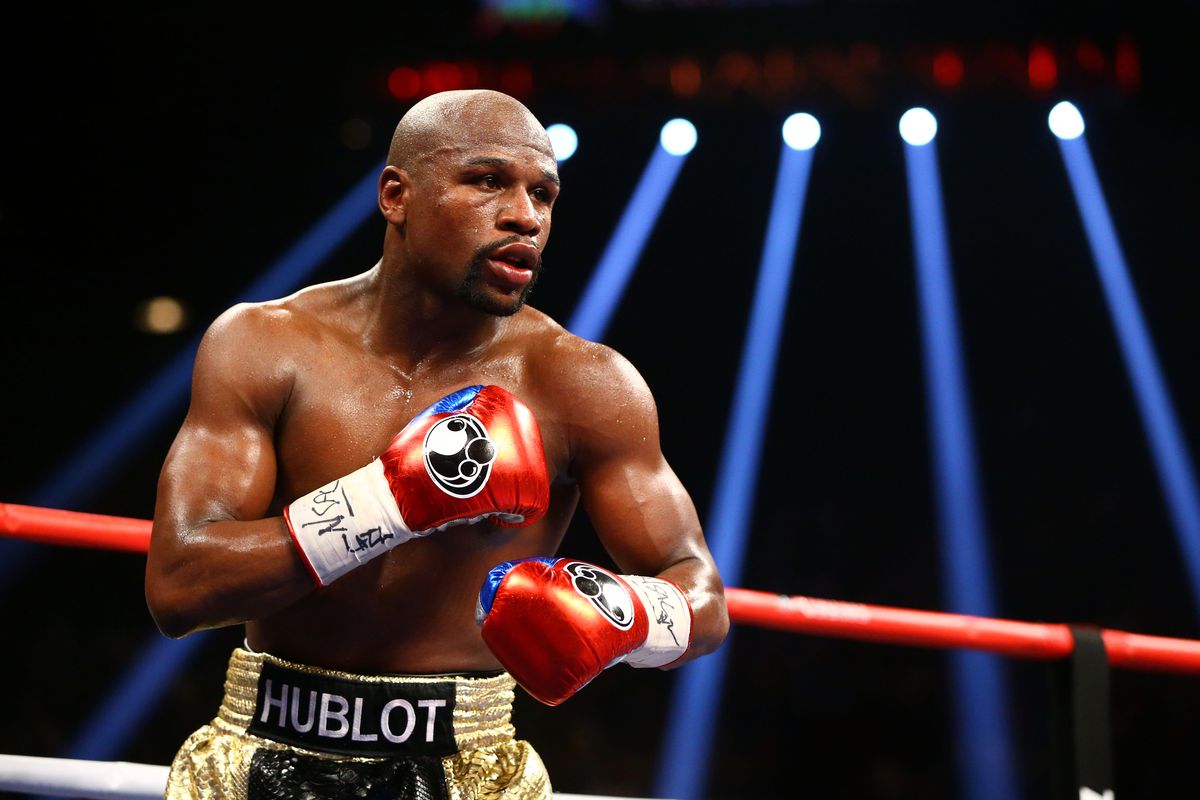New kids on the Hill: what you need to know about President Trump’s Cabinet
February 6, 2017
With the Trump administration fully under way, the Cabinet is beginning to take shape as well. Here’s what you need to know about some of the president’s most controversial appointees, from their personal beliefs and policy plans to their differences with President Trump’s stances.
Senator Jeff Sessions (R-AL) – Attorney General
A conservative senator, former district attorney and state attorney general from Southern Alabama, Sen. Sessions has voiced controversial opinions in the past against abortion and same-sex marriage. His stances on civil liberties and African-American rights have been particularly concerning to some. Sen. Sessions has spoken out against the Voting Rights Act of 1965, which made sure that outlawed racially discriminatory voting practices; he also voted against the Hate Crimes Prevention Act.
This has lead to major doubt from many liberals in the senator’s ability and willingness to act on behalf of all Americans, even causing Sen. Cory Booker (D-N.J.) to break tradition and testify against Sen. Sessions in the confirmation hearing, the first time one sitting senator has testified against another sitting senator. Two representatives from the Congressional Black Caucus also joined Sen. Booker in testifying against Sen. Sessions. In an interview on MSNBC, Sen. Booker explained why he was testifying, saying “these are extraordinary times and they call for extraordinary measures.”
However, in his confirmation hearing, Sen. Sessions promised to separate his personal beliefs from his responsibilities saying that “you can bet” that he would enforce laws that he had voted against.
Additionally, despite being an early supporter of President Trump, Sen. Sessions vowed in his confirmation hearings to “say no” to the President if he tries to go above the law, coming out against several of the president’s proposals, including his ban on Muslim immigration and his hypothetical registry of American Muslims.
Rex W. Tillerson – Secretary of State
In contrast to the generally well-respected Sen. Sessions, President Trump’s nominee for Secretary of State, Rex W. Tillerson, the former CEO of Exxon, is a much more contentious nomination.
In his hearing, Tillerson faced intense questioning from Sen. Marco Rubio (R-FL) about his ties to Russia, particularly to Russian President Vladimir Putin. While he vowed to curtail Russian efforts to expand their influence around the world, he hesitated to call President Putin a war criminal despite President Putin’s civilian bombings in the province of Chechnya. There are also concerns about Tillerson’s qualifications for the job; Sen. Tom Udall (D-N.M.) said in a statement he was “particularly uneasy about his lack of experience.”
However, Tillerson has shown some discrepancies with President Trump’s stances. Most notably, he has a much different view on Muslim immigration. The president has vowed to enact strict regulations on American Muslims and Muslim immigration; he has also put forth an executive order limiting travel and immigration to and from seven predominantly Muslim countries. Tillerson, by contrast, has said he is opposed to a “blanket-type rejection” of an entire religion. Tillerson also disagrees with President Trump on the issue of NATO: the president has talked about stepping back from the organization, but Tillerson called the United States’ commitment to the organization “inviolable.”
General James N. Mattis – Secretary of Defense
Gen. Mattis, who retired from the Marine Corps in May 2013, is President Trump’s Secretary of Defense. Since he has been retired from active duty for fewer than seven years, a legal waiver was required to allow Gen. Mattis to take office as Secretary of Defense; the Senate passed it easily 81-17 on January 12. He was also the first Cabinet member to be confirmed, receiving strong bipartisan support.
Sen. Maggie Hassan (D-N.H.) said in a statement that she voted to confirm Gen. Mattis because he “clearly had the qualifications and character necessary to serve as Secretary of Defense.”
Before his confirmation hearing, Gen. Mattis provided written responses on policy questions to the Senate Armed Services Committee that touched on a range of important topics. Gen. Mattis took a tough stance on the conflict in Syria, saying it was the cause of destabilization not only in the Middle East, but in Europe as well. Like Tillerson, he broke from President Trump on NATO, saying that U.S. support should not be conditional of financial considerations and that the organization “enormously” helps U.S. security interests.
He also separated himself from President Trump’s plan for the war on terrorism. President Trump has said it may be necessary to go after terrorists’ families to defeat ISIS, an approach which Gen. Mattis opposes, for both legal and ideological reasons.
Betsy DeVos – Secretary of Education
The president’s pick for Secretary of Education, Betsy DeVos, is a four-time chair of the Michigan Republican Party and a successful businesswoman. She has also taken on the role of educational philanthropist, and is a staunch supporter of school choice. This would allow families to pick where their child went to school, including charter and private schools, the tuition of which would be paid for in part by government vouchers.
Those in favor of school choice have come out with strong support for DeVos, including former Massachusetts governor and 2012 Republican presidential nominee Mitt Romney, who called her “smart, dynamic, no-nonsense and committed” in an op-ed piece in the Washington Post.
DeVos is a controversial pick because while she has been involved in education, she has no day-to-day experience in schools, which has caused some concerns about her abilities to act in schools’ best interests. Those opposed to education vouchers also worry that she will draw money away from the public school system. There are also ethics concerns about DeVos’ financial entanglements and possible conflicts of interest.
Former Governor Rick Perry (R-TX) – Secretary of Energy
To head the Department of Energy, the president chose former Texas governor Rick Perry, who famously said in a 2012 presidential primary debate that the Department of Energy shouldn’t exist. Additionally, according to The Hill, when Perry accepted the nomination, he thought he would be taking on a role as a global ambassador for the U.S. oil and gas interests which he has long championed. He did not realize at the time he would become embroiled in a variety of complex national security issues including the United States’ arsenal of nuclear weapons.
However, since realizing what the job will entail, Perry has been working hard to educate himself on his responsibilities, a Trump transition official told The Hill.
While governor of Texas, Perry helped Texas prosper during a recession, helping create over two million new jobs, and almost 30 percent of private sector jobs in the nation.
Cabinet officials play a key role in advising the President and creating policy in their respective areas. If or when they are confirmed, these nominees will play a big part in shaping America’s trajectory during the Trump administration.











